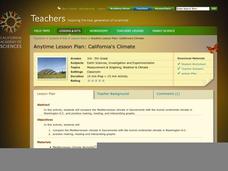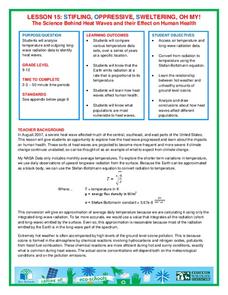UAF Geophysical Institute
Observing the Weather
How can you predict the weather without any technology? Young scientists learn to forecast the weather using traditional Native American techniques. Based on their observations of the weather, as well as talking to their classmates, they...
Pimsleur
Brazilian Weather & Clothes
What's the weather like today? Make sure your pupils can respond in Portuguese by teaching them the vocabulary in this lesson. Class members talk about seasons and vocabulary, complete worksheets on climate and clothing, and participate...
NASA
How Does a Hurricane Form?
Young meteorologists examine the formation of a hurricane in a resource focused on severe weather conditions. Once they learn that a hurricane is also a tropical cyclone, and detail the different levels associated with tropical storms,...
California Academy of Science
California's Climate
The United States is a large country with many different climates. Graph and analyze temperature and rainfall data for Sacramento and Washington DC as you teach your class about the characteristics of Mediterranean climates. Discuss the...
Curated OER
Weather on the Internet
What the weather like today? How about in other countries? In Celsius and Fahrenheit? Have your learners use the Internet to look up the weather in Spanish! They'll discuss their findings in Spanish with a partner and create a chart over...
National Wildlife Federation
Stifling, Oppressive, Sweltering, Oh My!
Looking for a hot date? Pick any day in August, statistically the hottest month in the United States. The 15th lesson in the series of 21 instructs pupils to investigate the August 2007 heat wave through NASA data, daily temperature...
NASA
Comparing Temperature and Solar Radiation for Common Latitudes
There's snow much to learn! Excited individuals use real-world data to discover how latitude affects the odds of a snow day. Scientists compare latitude, solar radiation, and temperature using NASA data for several locations....
MENSA Education & Research Foundation
Hurricanes
Learn the ins and outs of hurricanes through a series of lessons answering, "What is a hurricane? How does it travel? How is one formed, measured, and named?" Information is presented through informative text and images, while...
Wind Wise Education
What Causes Wind?
Through watching several classic air pressure demonstrations, middle schoolers determine that high pressure areas move toward lower pressure areas, heated air causes a drop in pressure, and forces exist when pressures are unequal. By...
National Wildlife Federation
When It Rains It Pours More Drought and More Heavy Rainfall
Which is worse — drought or flooding? Neither is helpful to the environment, and both are increasing due to climate change. The 16th lesson in a series of 21 covers the average precipitation trends for two different climates within the...
National Wildlife Federation
Ghost Town
Around 93 percent of the reefs on Australia's Great Barrier Reef have been bleached, and almost one quarter of them are now dead. Scholars research the sea temperatures, especially around the areas with coral reefs, to make connections...
KOG Ranger Program
Fire Behavior in Forests
Understanding the ways a fire will act is a key factor in fire safety and fire prevention. Young campers focus on how the weather and terrain can affect the behavior of a fire with topographic maps and different scenarios.
Microsoft
Variables
You won't want to replace the resource with anything else. Future computer scientists use Minecraft to learn about variables in computer coding. They engage in several activities to master the variable code block, then apply it in an...
EngageNY
Chance Experiments
Class members are introduced to probability using terms such as impossible, unlikely, likely, and certain. Numbers between zero and one are associated with the descriptions of probability. Pupils find the likelihood of chance experiments...
NOAA
The Cycle of Water
Help young scientists get to the bottom of the water cycle with this comprehensive earth science lesson. After first viewing and discussing presentations about the states of water and the water cycle, the class performs a series of...
Centers for Ocean Sciences
Ocean and Great Lakes Literacy: Principle 7
Your mission, should you choose to accept it, is to take your class on an underwater adventure. The final installment in a seven-part series involving salt and freshwater bodies takes junior oceanographers below the surface in...
Other popular searches
- Extreme Weather Lesson Plans
- Severe Weather Activities
- Severe Weather Phenomenon
- Severe Weather Safety
- Severe Weather Patterns
- Severe Weather Unit
- Effects of Severe Weather
- Severe Weather Lesson Plans
- Extreme Weather Project
- Extreme Weather Book Reports
- Living With Extreme Weather
- Causes of Severe Weather

















